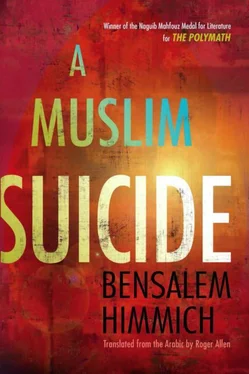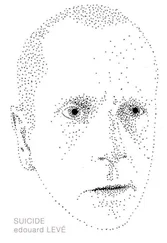But at the end of Rajab there came the day when I received the most unbearable news conceivable. At midday both men came into my room, their faces glum and utterly miserable, followed by a group of other people. From them I learned that my dear wife had died; they offered their sympathy and condolences. I looked like someone whose tongue had been cut out or who had swallowed steel; my only response was with eye movements and gesticulations. The captain of the vessel and its pilot both told me about the journey and the difficulties they had faced. They particularly emphasized the efforts they and the women on board had made to save my wife; she had been struck down by a fever, and it had reached its most intensive stage in the boiling heat of `Aydab, that unlucky spot. But God had decided to take my wife to Himself, along with five other victims. They handed me the death and burial certificate before departing along with the group of other people, all of whom also expressed their sorrow and condolences.
No sooner had they left than both Ghaylan and Yasir burst into tears. I meanwhile was trying to get my tongue to work, while simultaneously holding back my own tears and preventing myself from feeling giddy. They then took me into the garden, where a host of mourners, students, and disciples were gathering, people I knew and others I didn't.
Just after noon, a group of sharifs arrived, with Abu Numa at their head. They all offered me their condolences, while Yasir was yet more affected by the fact that the governor and the sharifs had come to see me. He and his assistants did their level best to offer a welcome to the mourners according to custom and tradition. Just before the afternoon prayer, everyone left for the sacred enclosure in a procession that I myself headed, accompanied by the notables of the city. Their leader held on to my arm and from time to time whispered words of sorrow and sympathy into my ear. Once the ablutions and prayers were over, we were summoned to the prayer for the departed. The ceremony was conducted in a reverential manner. When it was completed, I told my distinguished companion the governor that I dearly wished to return to my residence and rest. He suggested that he would accompany me on a trip to visit my late wife's grave and gave me a choice of two dates. "The best charity is that which comes soonest," I said, quoting the old proverb. With that, we embraced, and everyone went their own way.
Once back at my residence, I locked the door and lay down on my bed. Now the tears came, and I started sobbing quietly, fully aware that there was no way of salving my shattered soul and broken heart. I felt absolutely terrible and was unable to sleep, except perhaps for the occasional nap. This went on for two days or more, at the end of which Yasir knocked on my door to make sure I was still among the living. He told me that the governor had been asking for me. I decided to get up, wash, and pray. As I left the house, I acknowledged the condolences of a new set of people, including students and disciples. I first checked on the date and time, then headed for the governor's palace, where I found Abu Numa waiting for me.
As I walked toward him I offered my apologies, but he gave me a warm and sympathetic welcome. He took me to a back courtyard where a troop was ready to leave. We both mounted horses and headed for the Jedda port surrounded by armed guards. Once there, we boarded a boat along with our mounts, bound for 'Aydab. When we arrived, he headed for the cemetery to the south of the town that had been designated on the death and burial certificates. The five members of the guards split up to look for the other victims who had been buried here, and I trusted my heart and instincts to direct me to the place where my late wife was buried. I walked very slowly, followed by my companion who had made this trip possible. When I stopped, I took a look at the letters inscribed on the grave to my left, and there indeed was my wife's grave. Without tears or panic, I leaned over the soil and inhaled the blessed scent of the precious one it contained. The sharif did likewise. I then pronounced some short verses from the Qur'an and prayers invoking God's mercy on the pure spirit of my wife, asking that the Creator grant her entry into the broad expanses of His paradise. All around me, the sharif, his guards, and some local indigents kept repeating their amens and invoking phrases appropriate for the place and occasion. Both in the cemetery and by the gate I handed out as many alms as I could, as did the governor himself. With that we returned to Mecca. During the return journey the governor asked me about the idea of building a tomb for my late wife, but I declined his offer, saying that I thought it better for her grave to be just like the majority of other believers. Apart from that conversation, the governor and I remained silent for the rest of the journey.
I spent the rest of the month of Sha`ban alone in my residence. Ghaylan and Yasir did their best to make sure that my seclusion and devotion to both worship and rest were not disturbed. Truth to tell, during my time alone I was exploring entirely new and unknown terrain since I was gradually increasing the doses of some herbal substances so that I could get more and better sleep. The time I spent asleep during this particular phase and in my current mental state was filled with terrifying and totally abnormal visions. They were of such a kind, that, had I chosen during my periodic intervals of wakefulness to put on paper the kinds of things I could remember from these nightmares, I would have confirmed for sure to both politicians and jurists that I was indeed an infidel, someone who deserved to die.
With the arrival of the fasting month of Ramadan I decided to spend it in Al-Shushtari's hut. My primary goal was to rid myself of the flood of nightmarish visions I was having and also to strengthen my ties with the Maghribi folk in the Valley of Solomon's Spring. That is precisely what I did, but only after informing Yasir of my plans, leaving some of my belongings with him, and using his expertise to leave Mecca without my students and visitors being aware of it.
When I reached my destination on horseback, I was given the warmest of welcomes by the peasants. I explained my situation to them and made it clear that all I needed was seclusion and the opportunity to worship. They all expressed their condolences on the death of my wife, and in a spontaneous and sincere way that brought tears to my eyes. They all swore the most solemn of oaths in the name of God and his holy men, with Al-Shushtari in the forefront, that they would protect me and keep my secret safe, even if a tyrant or legal authority inquired after me.
Al-Shushtari's hut here was like the one he had built in Bijaya, the only difference being that I had this one to myself and did not have to share it with either a Christian or a Jewish ascetic. Within its walls I found peace and quiet. I only left it once in a while in order to take a stroll or eat breakfast and chat with my guardians. As a way of preventing the nightmarish visions from overwhelming me, I slept as little as possible, but the amount of time I stayed awake at night meant that, during the afternoons and at twilight time, I felt a powerful urge to take naps. When that happened, I used to have a number of daydreams, but, when I woke up, I could only remember snippets of two of them, although both augured ill.
In the first I saw myself sitting down with Abu Hayyan al-Tawhidi, accompanied by another man who looked both wise and august. Al-Tawhidi kept leaning over and reciting prophetic traditions to me, all without attribution as was usually the case with him. He would tell me that some of them were examples of hadith qudsi,* while others were ones that the Prophet had dictated to him in dreams. I then watched as he turned to his companion. "So it's wrong, Sophocles," he said, "to follow your views and state that man desires to live long even when he simply shifts from one misery to the next. I have to tell you clearly, as an old man with a decrepit frame and bent back, that your views are lacking in precision. Like me, you yourself will not be spared the impositions of a long life nor will you see any more benefit from this mistaken view than anyone else. Quite to the contrary, miseries accumulate and beset mankind, no matter what the age or time."
Читать дальше












